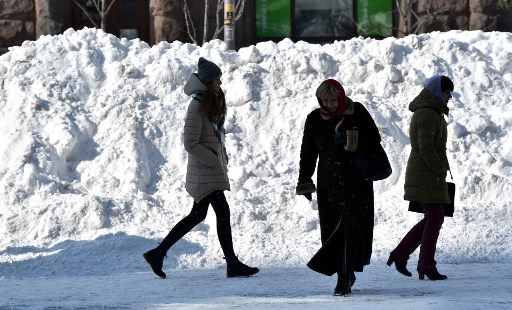Russian gas monopoly Gazprom said it would seek to terminate its contracts with Ukraine’s state-owned gas and oil monopoly Naftogaz in an arbitration tribunal in Stockholm on March 3.
“The court attributed its decision to the sharp decline in the Ukrainian economy. We are firmly opposed to Ukraine’s economic problems being solved at our expense,” Gazprom’s CEO and Chairman Alexey Miller said. “Gazprom is forced to immediately commence the procedure of terminating its gas supply and transit contracts with Naftogaz of Ukraine at the Stockholm tribunal.”
After a two-year break, triggered by Russia’s war, Russian gas supplies to Ukraine were set to resume on March 1.
But on that same day the Kremlin indefinitely shut off natural gas supplies to Ukraine on March 1.
The Stockholm court ordered Ukraine’s Naftogaz to buy 5 billion cubic meters of gas annually until the end of a current contract in December 2019. It also ruled Russia’s state-controlled Gazprom to pay $2.56 billion for undelivered volume of gas.
Gazprom said that it will file a new lawsuit against Ukraine.
According to its press service, Naftogaz considers the shut off of supplies as a violation of the gas contract and court ruling. Naftogaz did not receive any documents from Gazprom about its intention to break the contract and said that the contract cannot be terminated.
Naftogaz also said that the contract between Russia and Ukraine can’t be teared up unilaterally.
It said that Ukraine continues to transit Russian gas to European countries despite the “systematic violations by the Russian side of contractual pressure standards in the system.”
Naftogaz transmitted 522 million cubic meters of Russian gas to European Union countries and Moldova. At the same time, Gazprom didn’t deliver to Naftogaz 18 million cubic meters of gas for which the company had made a prepayment.
Gas reserves
But Ukrainian President Petro Poroshenko says that the country no longer faces shortages for the rest of the winter because of gas supplies from European Union countries.
“The critical situation is resolved,” Poroshenko said during a meeting with the management of Ukrainian gas transmission operator Ukrtransgaz on March 3.
“We have increased gas supplies from the EU: from Poland, Slovakia, and Hungary. As of now, the entire deficit is completely covered,” Poroshenko said.
Gazprom’s decision not to supply gas forced Ukraine to reduce its gas consumption amid heavy snow and sub-freezing temperatures.
Speaking in parliament on March 2, Minister of Energy Ihor Nasalyk recommended that schools and universities close until March 6, as Ukraine had to restrict its gas consumption. Heat generating companies temporarily switched to mazut, a low-quality fuel oil. He reported that Ukraine needs to save 15-20 million cubic meters of gas a day.
Consequences for Gazprom
Naftogaz CEO Andriy Kobolev said in an interview with Channel 5 that by refusing to supply gas to Ukraine, Gazprom lost its right to apply the contract’s “take-or-pay” rule, which stipulates that buyers have to pay for the full amount of gas whether it was physically delivered or not.
Poroshenko previously said on March 1 that if Russia fails to fulfill the arbitration’s order Ukraine will file a new lawsuit and possibly arrest its assets, including those which are part of Nord Stream 2.
Russia’s Gazprom is soon to become Europe’s largest gas supplier with two new gas pipelines Nord Stream 2 and TurkStream that are currently being under construction.
Meanwhile, Naftogaz press service said that the shortage of Russian gas has negatively influenced EU’s perception of Gazprom and its Nord Stream 2 project.



